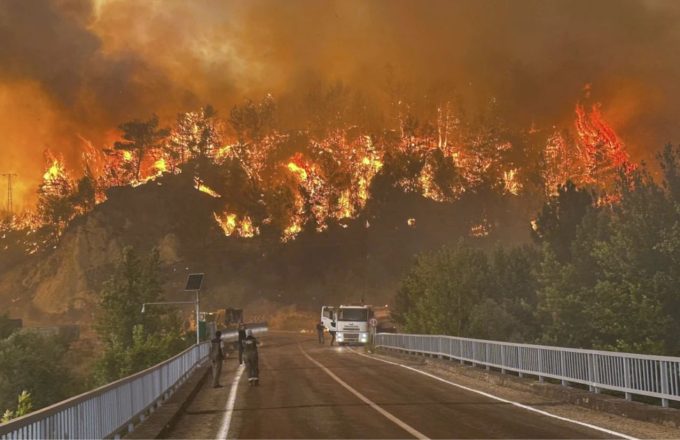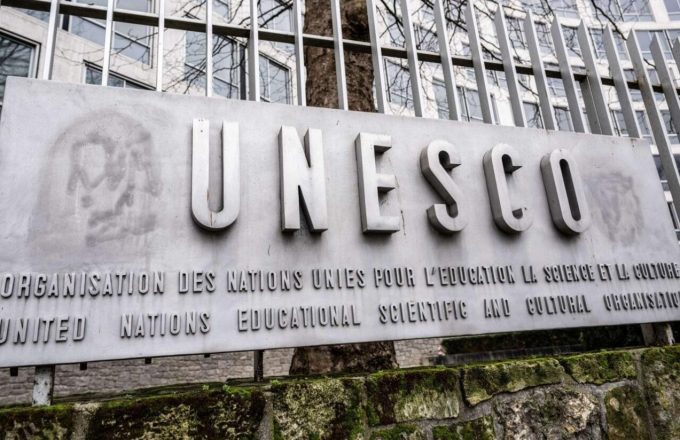Paris and fifteen other regions in France were placed under red alert on Tuesday as a severe heatwave swept across southern Europe, setting historic temperature records, sparking wildfires, prompting mass evacuations, and forcing school closures. The extreme weather, which is also affecting Spain, Portugal, Italy, and Turkey, has triggered a series of emergencies underscoring the growing impact of climate change across the continent.
In France, the national weather agency Météo-France issued its highest-level heat alert, with temperatures expected to surpass 41°C in several areas, including the capital. “We’ve never seen anything like this,” warned Ecological Transition Minister Agnès Pannier-Runacher. Authorities responded by closing all or part of 1,350 schools—almost double the number shut down the previous day—and imposed restrictions on high-emission vehicles in the Île-de-France region, while closing access to the top of the Eiffel Tower as a safety precaution.
The intense heat also continues to grip the Iberian Peninsula. In Spain, although temperatures began to ease slightly since the weekend, the State Meteorological Agency (AEMET) warned that central and southern regions could still see highs above 40°C. On Saturday, the town of El Granado in Andalusia reached 46°C, setting a new June record and surpassing the 1965 benchmark of 45.2°C registered in Seville.
Portugal experienced even higher readings. In the town of Mora, roughly 100 kilometers from Lisbon, temperatures hit 46.6°C—the highest ever recorded in the country for the month of June, according to local media. While firefighters managed to contain a forest fire near Castelo Branco in central Portugal, authorities cautioned that fire risk remains extreme in many areas due to dry vegetation and persistent heat.
Wildfires are also raging across other parts of the Mediterranean. In Turkey, over 50,000 people were evacuated from the province of Izmir, where rescue teams are battling blazes fanned by winds reaching up to 120 km/h. In Italy, multiple regions are fighting active fires, and two heat-related deaths have been reported: a 77-year-old woman died from smoke inhalation in Potenza, while a 70-year-old man was swept away by a mud and water surge in Piedmont.
Italy’s Health Ministry declared a red heat alert in 18 cities, including Rome, Florence, Milan, and Verona. According to meteorologist Antonio Spano, founder of ilmeteo.it, the heatwave could persist through the weekend or beyond. Images shared by Italian media showed tourists and residents fleeing fires in coastal areas like Baia Domizia, near Naples, where flames reached pine forests adjacent to hotel complexes. “I’ve never experienced anything like this. We were surrounded by flames at least 30 meters high,” wrote Cellole mayor Guido di Leone on social media.
The crisis has also reignited debate over prison conditions in countries such as France and Italy. “The heat exacerbates existing frustrations and tensions,” warned Wilfried Fonck, a leader of the French prison workers’ union.
In cities, the heat’s impact is intensified by the so-called “urban heat island effect,” which raises temperatures further in densely built areas with little vegetation. Emanuela Piervitali, a researcher at Italy’s Institute for Environmental Protection and Research (ISPRA), explained the phenomenon is worsening conditions for urban populations.
Local governments have implemented various relief measures. Marseille opened public swimming pools free of charge, while Venice organized air-conditioned museum tours for seniors. In Madrid, French tourist Agathe Lacombe told AFP how the heatwave forced her to rearrange her schedule: “You have to do everything in the morning and go back inside during the hottest hours.”
In the workplace, Spanish unions have called for greater protections after the deaths of two workers believed to be linked to the extreme heat. The phenomenon has also reached the Balkans and the United Kingdom, where London hit 34°C on Tuesday. Wimbledon opened with a record 31.4°C on its first day, according to the BBC.
The heatwave also caused the Mediterranean Sea to record its highest average surface temperature for June, according to the European Earth observation program Copernicus—further worsening the region’s meteorological and ecological outlook. Experts agree that climate change will continue to drive more frequent and intense extreme weather events in the years to come.




















